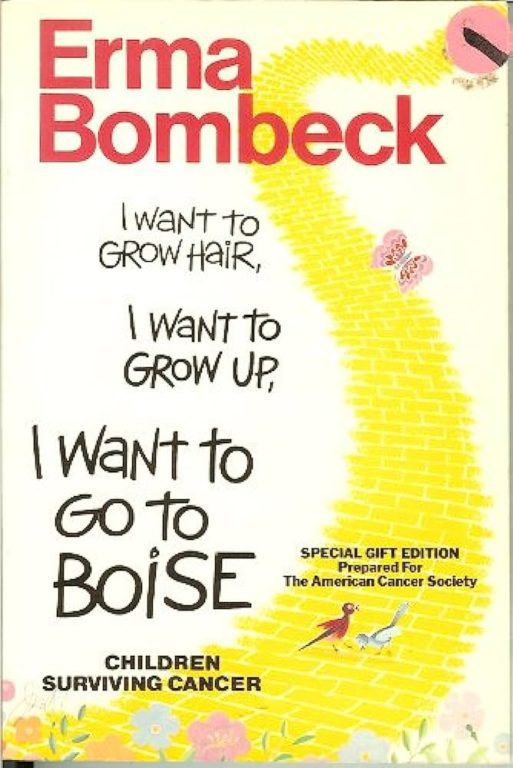 Until the mid-1980’s, Erma Bombeck considered herself a light comedy writer. In books such as “At Wit’s End” and “Aunt Erma’s Cope Book,” she wrote about the amusing things that happened in her family and with her friends.
Until the mid-1980’s, Erma Bombeck considered herself a light comedy writer. In books such as “At Wit’s End” and “Aunt Erma’s Cope Book,” she wrote about the amusing things that happened in her family and with her friends.
Then, in 1987, she met Ann Wheat, the director of Sunrise Camp, a camp for children with cancer. Wheat wanted Bombeck to write an optimistic pamphlet or booklet for children with cancer and their families.
Bombeck was reluctant. She couldn’t see anything light or funny about children with cancer. Then she visited Camp Sunrise and fell down the rabbit’s hole into a new world of humor. The kids at the camp did typical kid things like sneaking out at night to swim and having food fights. But they also had a unique brand of humor. Some of the boys, for instance, placed bets on who could withstand chemotherapy the longest without throwing up. And one girl said she wouldn’t let a doctor work on her unless that doctor could first solve a Rubik’s cube.
Erma Bombeck quickly realized that she needed to cover far more material than would fit in a book or a pamphlet. Instead, she wrote a 174-page book, “I Want to Grow Hair, I Want to Grow Up, I Want to Go to Boise: Children Surviving Cancer.”
Bombeck cuts right to the chase in the first chapter of her book, “Am I Gonna Die?” She manages to keep statistics interesting as she discusses how cure and remission rates are improving by leaps and bounds. This is probably the most dated chapter in the book, using numbers from 30 years ago. Since “I Want to Grow Hair…” was written, new treatments have evolved rapidly and cure and remission rates have improved enormously.

Credit: biography.com
Erma Bombeck covers all the bases in this book. She writes about the children who are sick, discussing the ways that they keep hope and optimism alive. She writes about the roles of fathers, mothers, and friends.
Then she turns her attention to life after cancer. One young man she talks to says he is tired of being the poster boy for surviving cancer. Other children wear their bald heads, scars, and prosthetics like badges of honor.
Next, it’s on to brothers and sisters like little Max who ran screaming through the park to tell his friends that his sister was in remission. He then returned to the car and asked his mother, “What’s remission?”
Erma Bombeck then returns to the camp and asks the kids about their favorite experiences as campers. Some responses include: “We got four bungee cords and tied Molly to a tree.” And “Camp is the only place I don’t worry about cancer. I worry about mosquitoes.”
At the end of the book, Bombeck cautions her readers not to take a pessimistic view of things, whether those things are cancer or the unexpected acquisition of a puppy. There are, she reminds us, a great many things that work out for the best.
“I Want to Grow Hair…” is a charming book, full of hope and Bombeck’s trademark humor. She does not glaze over the harsh realities of childhood cancer, but neither does she wallow in them. She quotes her child audience extensively and even includes their artwork.
If you love a child with cancer, or even if you’re having a bad day and just need a gentle lift, this is the perfect book to reach for.

Credit: evidentlychochrane.net

 “I Want to Grow Up, I Want to Grow Hair, I Want to Go to Boise” by Erma Bombeck
“I Want to Grow Up, I Want to Grow Hair, I Want to Go to Boise” by Erma Bombeck



 “Hands Up to the Sky” by Michael Franti & Spearhead
“Hands Up to the Sky” by Michael Franti & Spearhead
 Coping With Election Grief
Coping With Election Grief















One of my patient’s with childhood leukemia, who I cared for during my pediatric clerkship in 1977, contacted me again 22 years later, when she read my name in the credits of this book, to tell me how well she was doing, and how much she enjoyed life. That was truly humbling and joyful, just the way Irma came to discover in writing this book.
Report this comment